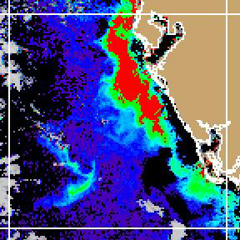|
|
Ecological forecasts predict the impacts of chemical, biological, and physical changes on ecosystems, ecosystem components, and people. NOAA's National Ocean Service (NOS) has initiated a suite of ecological forecasts to support more effective ecosystem management. Ecological forecasts bring together wide-ranging research and observation programs to allow coastal resource managers to answer the "what if" questions about factors that affect coastal resources. Benefits of Ecological Forecasts Major benefits of ecological forecasts are (1) improving decisions to sustain ecosystem productivity and lessening the impacts from extreme natural events and human activities; (2) bringing scientists and resource managers together to solve resource management problems; and (3) focusing scientific research and monitoring priorities to reduce uncertainties in ecological forecasts.
|
||||||||||||||||||||
|
Short-term regional: Predicting the development, persistence, movement, and the landfall of harmful algal blooms in the Gulf of Maine and the western portion of the Gulf of Mexico.
Long-term local: Predicting the effectiveness of seagrass restoration efforts in Tampa Bay, Chesapeake Bay, and Southern Pamlico Sound based on projected wave disturbance and major storms.
Long-term local: Climate change and intertidal risk analysis - forecasting the effects of climate change on the biogeography of foundation species in estuarine and rocky intertidal ecosystems.
Long-term national: Predicting changes in the size of the Gulf of Mexico dead zone based on nutrient impacts in the Mississippi River and its Midwest tributaries.
Long-term regional: Predicting the potential population of cod and haddock in Georges Bank based on predator/prey relationships and environmental variability.
Long-term regional: Predicting shellfish bed closures based on freshwater input (rainfall) due to large coastal storms.
|
NOAA's National Ocean Service has initiated a suite of ecological forecasts to support more effective ecosystem management.
Depending on the ecosystem and the phenomenon being forecast, responses to ecological variables can take place on short-term or long-term time scales (hours to decades) and on spatial scales from local to regional to global.
- NOS Program Offices
- Center for Operational Oceanographic Products and Services
- National Centers for Coastal Ocean Science
- NOAA Coastal Services Center
- National Geodetic Survey
- Office of Coast Survey
- Office of National Marine Sanctuaries
- Office of Ocean and Coastal Resource Management
- Office of Response and Restoration

Revised November 01, 2007
| Questions, Comments? Contact Us | Report
Error | Disclaimer | About
the Site | User Survey
National Oceanic and Atmospheric
Administration | U.S.
Department of Commerce | USA.gov
http://oceanservice.noaa.gov/topics/coasts/ecoforecasting/welcome.html



